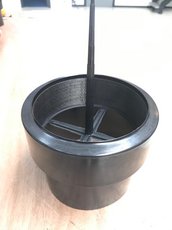IMCOLOR – Injection Moulding with Continuous Local Reinforcements
In the IMCoLoR project the scroll of an air cycle machine is manufactured with an injection molding process with the local integration of continuous carbon fiber reinforcements.
Project Partners
apppex, FACC, TPRC, Liebherr Aerospace (Topic Manager)
Duration
01.02.2017 – 31.07.2020
Funding authority
European Commission: Horizon 2020 - Clean Sky 2
Motivation
IMCOLOR’s main objective is the development of a novel process for the advantageous combination of injection molding and thermoplastic automated fiber placement with in-situ consolidation (TP-AFPisc) to manufacture a continuous fiber reinforced air cycle machine part wherein high-performance thermoplastics like PEEK are involved. The TP-AFPisc process is a change compared to the state of art, where composite structures typically build within process chains. TP-AFPisc is integrating the major steps of material deposition and consolidation without expensive autoclaves and represents an additive manufacturing process. PEEK injection molding is a challenge in combination with undercuts and thermoplastic composite inserts. Typically, these inserts are only half-sided overmolded, to keep the insert in position during injection. However, there is no complete encapsulation of the sensitive composite inserts, that can protect the exposed fibers or ensure an overall part surface with the accuracy of injection molding standards. Therefore IMCOLOR uses innovative lost core technology and load path tailored composite inserts manufactured by TP-AFPisc for complete encapsulation by PEEK injection molding.

Method
The aim is to develop a synergy between injection molding and the TP-AFPisc process beyond the state of the art, which enables future lightweight design at high mechanical performance with automated, reproducible production techniques under ecological friendly conditions. Injection molding is a wide spread technology for thermoplastic processing, but restricted to the use of short fiber material. It offers a large spectrum of geometric freedom and enables high production rates. In high-loaded structures, continuous fiber reinforcements are demanded because of their excellent thermomechanical properties. However, due to the casting process, it is not possible to use continuous fibers in injection molding. IMCOLOR closes this gap and enables a high efficient utilization of material. The expensive endless fiber are only used in the necessary sections of the part. The fiber architecture is precisely adapted to the user’s needs by engaging TP-AFPisc manufactured inserts. Effort in trimming of composite parts is minimized and scrap is reduced. No surface preparation is necessary for the inserts, because they are bonded to the polymer by autohealing during overinjection. The final part profits from the high loadable endless fiber reinforcement that is completely covered by injection molding compound. The injection molding process adds its benefits in terms of surface quality, tolerances and protection against environmental influences (e.g. impactors, corrosive media) to the sensitive endless fiber architecture. IMCOLOR’s advanced technology in process and material will be shown by demonstrators. The consortium will prove the new developments in process, component and scanning trials to show their suitability for the aerospace application.
Publications
JEC 2019, CORDIS - EU research results
Boos, D.; Scherzer, T.; Kind, K.; Zaremba, S.; Drechsler, K.: Towards a Robust, Water-Soluble, Lost Core Material – part one: Unreinforced, Binder-Free Salt. Journal of Plastics Technology, 19 (3), 2023, 118-164. DOI: 10.3139/O999.01032023.


